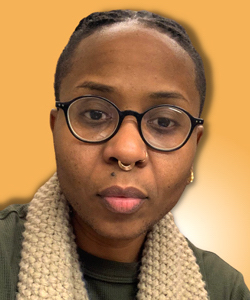These days, it’s hard to go anywhere without encountering artificial intelligence (AI). Predictive text offers to finish our web searches and our text messages. AI learning-based software can produce everything from research papers to poetry, solving complex math equations to writing computer code. AI can be used to write algorithms, collect data on which areas experience the most gun violence, and dictate which neighborhoods receive access to vital resources.

This year, School of Education Ph.D. student ParKer Bryant is among five students who make up the 2022-2024 Lender Center for Social Justice Fellowship Project, setting out to investigate how AI weapons systems transform war and surveillance, and they will also analyze how AI accentuates our social and political vulnerabilities to violence.
The research team will use collaborative documentation, GIS-enabled mapping, and immersive media techniques to study precisely how AI weapons and systems may bring about social and political changes.
These research-based advocacy projects will be directed by Mona Bhan, Associate Professor of Anthropology in the Maxwell School of Citizenship and Public Affairs. Last fall, Bhan was selected as the Center’s 2022-2024 faculty fellow.
Bhan will conduct the project along with other University faculty; University centers, such as the Autonomous Systems Policy Institute; and this new cohort of student fellows to analyze and disseminate findings on the social justice implications of AI weaponry. The project is part of a larger research and advocacy project Bhan is carrying out with her longtime collaborator, Haley Duschinski of Ohio University.
Bryant joins Aren Burnside, Nadia Larissa Lyngdoh-Sommer, Cheryl Olanga, and Anna Terzaghi as 2022-2024 Lender Center student fellows. They will be provided with a $2,000 stipend and will have opportunities for additional funding.
A dedicated teacher and learner, when COVID struck in the spring of 2020, Bryant started researching where to obtain her doctoral degree. That’s when she came across the research on literacy and teacher preparation by Marcelle Haddix, Associate Provost for Strategic Initiatives and Distinguished Dean’s Professor of Literacy, Race, and Justice.
Bryant applied for the student fellowship in part because she wants to study how to achieve balance between AI and education, specifically focusing on the implications that stem from releasing much of our memory and cognition to technology. The end goal? Learning how to make peace with this new technology while striving for a balanced relationship between AI and education.
“I’m interested in future thought, not necessarily being present in the right now, but in where we’re going. I applied because I wanted to do more with AI and education, focusing on the implications when we release so much of our cognition to technology, and what impact that has on us as a society and those of us who are educators,” says Bryant, who is pursuing a Ph.D. in Literacy Education from the School of Education.
